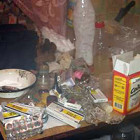
50 Cent Aims to Help Kids with New Anti-bullying Book
|
Gangsta rapper 50 Cent is best known for being “In Da Club” but his new young adult novel takes him to an unlikely place: the playground. The semi-autobiographical book, titled “Playground,” explores what happens when a 13-year-old bully must face the consequences of his actions. The novel arrives in the midst of a growing debate about the dangers of bullying in an age where, thanks to social websites such as Facebook, kids often can’t escape the abuse. Drawing on his own experiences as a teenage bully, 50 Cent hopes the novel will “have a positive influence on all teenagers,” according to a statement released this week. A similar book would have been helpful to him growing up, he said. The novel will be published in January by Razorbill Books and follows two previous books by 50 Cent—the 2005 memoir about his days as a crack dealer, “From Pieces of Weight,” and the 2008 follow-up, “The 50th Law.”








